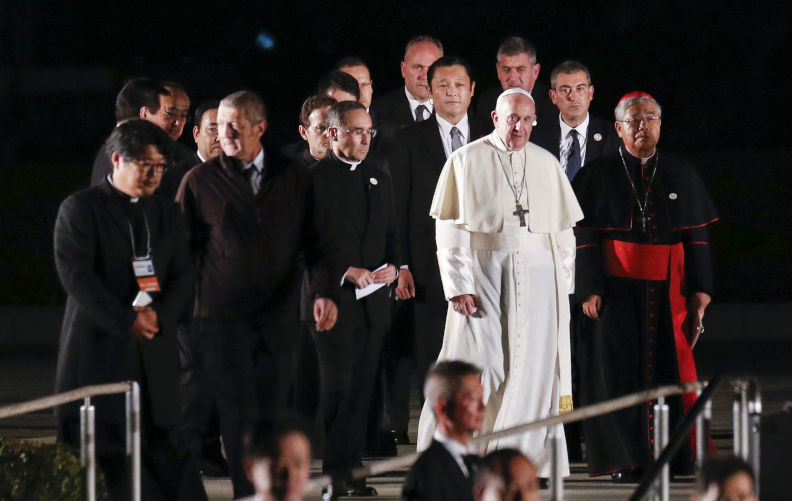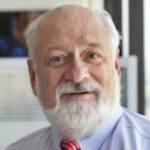Nihon Hidankyo, Japan’s nationwide organisation of atomic bomb survivors, was awarded the 2024 Nobel Peace Prize.
The award announcement said one reason the organisation received the award was that the personal testimony of its members has advanced “stigmatising the use of nuclear weapons.”
When Nihon Hidankyo’s award was announced on Oct. 11, I recalled the visit of Pope Francis to Japan five years ago in November 2019.
The Catholic Bishops’ Conference of Japan asked me to join that trip, something that surprised the pope on the plane from Rome when I, an American, was introduced to him as the Japanese bishops’ representative. It surprised me, too.
As we travelled, I wondered what the Pope’s objective was in making the trip. He did not have ecumenical or inter religious meetings on his agenda, a usual practice for papal visits to Asia. Neither would he go to Kyoto, the cultural capital of Japan.
The Pope’s schedules in Hiroshima and Nagasaki did not include visits to the museums commemorating the atomic attacks even though he went to both cities and spoke in both places about nuclear weapons.
When we were in Hiroshima, I realised the reason for the Pope’s unusual visit. He had come for the sake of a single phrase. He had come to Japan to stand in Hiroshima and reaffirm something he had said two years earlier.
“The use of atomic energy for purposes of war is immoral, just as the possessing of nuclear weapons is immoral.”
When he first said that in 2017, there were voices that disagreed with his condemnation of the possession of nuclear weapons. They argued that possessing such weapons is a deterrent to their use because no nation would use nuclear weapons if it knew that their use would provoke a nuclear response.
Pope Francis apparently wanted to answer those voices by reaffirming his position while standing within sight of the Hiroshima Atomic Bomb Dome.
On the plane taking us back to Rome, Pope Francis added that he wanted the immorality of possessing nuclear weapons added to the Catechism of the Catholic Church.
In an article in the Journal of Military Ethics, Christian Nikolas Braun of the Defence Studies Department of King’s College, London wrote:
“Breaking with the position held by his predecessors, Francis not only condemns the use of nuclear weapons as immoral, but also denies the morality of possessing the atom bomb for deterrence purposes. I point out that Francis’s alteration of Church teaching is grounded in a heartfelt conviction and has more than one source. In the political sphere, condemnation of possessing of nuclear weapons is grounded in a disillusionment about the failed promise of nuclear disarmament and the increased threat nuclear weapons pose in a post-Cold War international security environment. At the theological level, the pope speaks in a prophetic voice, calling upon the international community to be bold and finally rid the world of a weapon whose use is inherently immoral.”
At present, there are more than 12,000 nuclear weapons in the world. They are held by China, France, India, North Korea, Pakistan, Russia, the United Kingdom, the United States and, it is presumed, Israel.
Papal pronouncements probably have little force in most of those countries. There are only three nations among them where Catholics and other Christians wield any political power, France, the UK and the US.
In the UK and US, the Catholic bishops’ conferences have issued calls for disarmament at various times and periodically roll out those old statements on their anniversaries.
Most of those statements come from committees of the conferences rather than from the entire conference. The Americans did issue one major statement as a conference, The Challenge of Peace. But that was in 1983.
Of course, it takes little courage to say that one is in favor of reducing the threat of nuclear warfare and that the use of nuclear weapons is evil. It would, perhaps, take more courage for the bishops of the nuclear powers to confront their governments, societies, and even Catholics with declarations that by possessing nuclear weapons their nations are immoral.
Would those who hear the message even understand it? At least for most Catholics, including clerical preachers, the category “immoral” is misunderstood as “pelvic theology,” concerned almost exclusively with what is done between the navel and the knees.
The bishop, priest or deacon who preaches about moral issues connected with social justice or war and peace will draw little support even from his fellow preachers. He is more likely to be reported to higher-ups who will probably agree with the complainers.
And so, it is not surprising that though the pope has called the mere possession of nuclear weapons immoral, the People of God have been insulated from that disturbing teaching.
It is true that the simple declaration of the immorality of nuclear weapons will not have an immediate effect upon the armories of the world. Such change takes place, if ever, over long periods of time.
However, even long periods must start at some point. Is it not time to try to move the process forward a bit by making our commitment to peace a bit more specific, a bit more uncomfortable to the complacent and a bit more comforting to those who wonder if the Church has anything to say about our fears? Non-use of nuclear arms must move toward non-possession.
Pope Francis traveled halfway around the world to declare that next step. It is time for his fellow Christians who stay at home to make his declaration known.
Republished from UCA News, October 21, 2024
William Grimm, a native of New York City, is a missioner and presbyter who since 1973 has served in Japan, Hong Kong and Cambodia.
A graduate of the Columbia University Graduate School of Journalism in New York, he is the publisher of UCA News. Based in Tokyo, he regularly contributes columns. He is also the presenter of the popular Sunday homilies telecast through UCA News each week. A collection of those homilies has been published as Dialogue of One.

